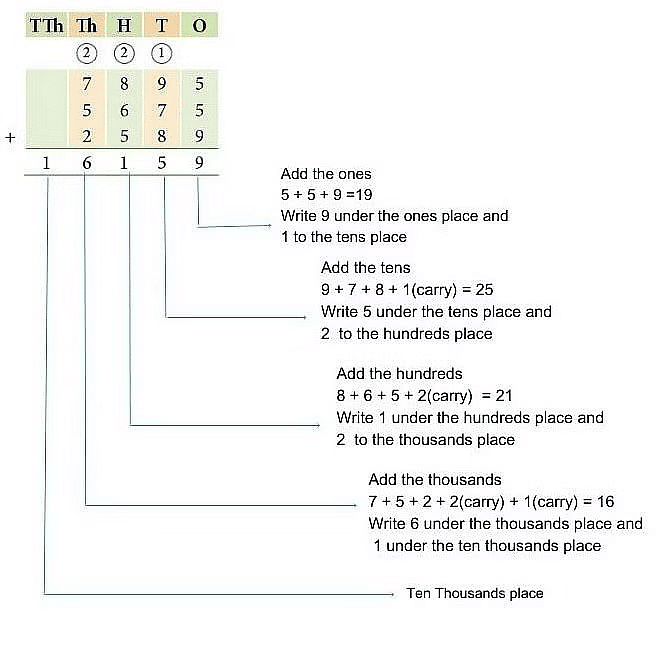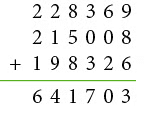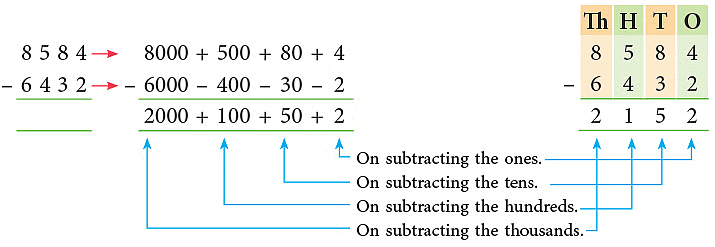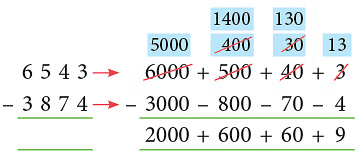Notes: Addition & Subtraction | Mathematics & Pedagogy Paper 1 for CTET & TET Exams - CTET & State TET PDF Download
| Table of contents |

|
| What's the Need of Studying Addition & Subtraction? |

|
| Let us Study Addition First! |

|
| What are the Properties of Addition? |

|
| Subtraction |

|
| Addition and Subtraction Together |

|
Addition and subtraction are fundamental arithmetic operations and are crucial topics for the Central Teacher Eligibility Test (CTET) and state-level Teacher Eligibility Tests (TETs). These operations form the foundation of mathematics education and are essential for developing numerical proficiency in students.
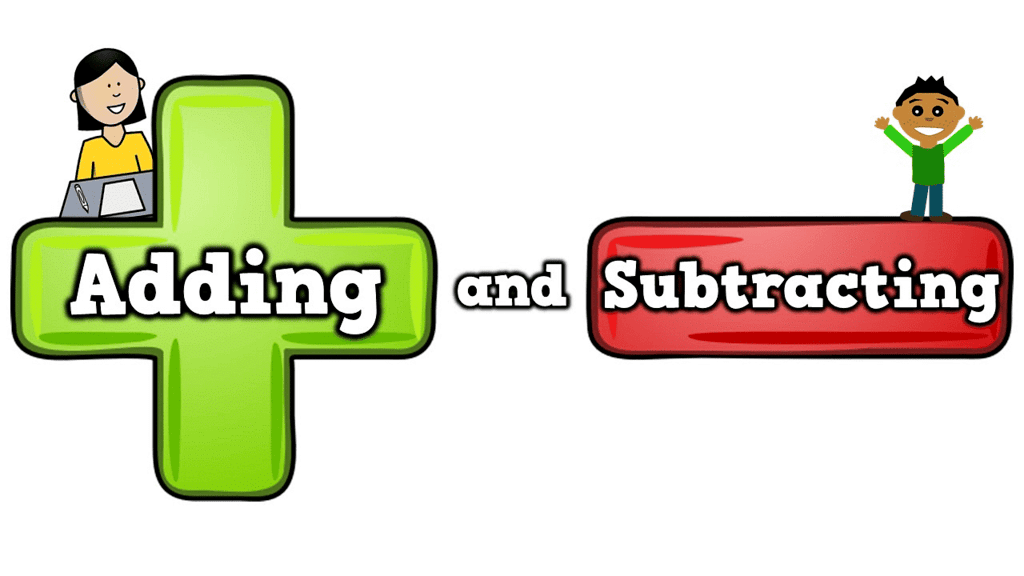
Addition
Addition is the process of combining two or more numbers to get a total or sum. It is one of the first mathematical operations that students learn and serves as the basis for more complex arithmetic.
Subtraction
Subtraction is the process of removing one number from another to find the difference. It is closely related to addition and is equally important in early mathematics education.
Addition and subtraction are fundamental skills that are extensively tested in CTET and state-level TETs. These operations are not only crucial for arithmetic proficiency but also for developing problem-solving abilities. Understanding and teaching these concepts effectively is essential for educators to help students build a strong mathematical foundation.
What's the Need of Studying Addition & Subtraction?
Hey there curious minds! Have you ever wondered why we need to learn about addition and subtraction? Well, these two magical operations are super important because they help us in so many fun and exciting ways in our daily lives. Let's explore the fantastic world of addition and subtraction together!
Addition is like having a party where you invite your friends and family, and everyone joins together to have a great time. We use addition when we want to find out the total number of items, people, or even the yummy candies we have!
Subtraction, on the other hand, is like sharing your toys or snacks with your friends. We use subtraction when we want to find out how many are left after giving some away or when we want to compare two different numbers.
Let us Study Addition First!
- Addition is one of the very common arithmetic operations used in mathematics.
- Addition is the operation to know the total quantity when two or more than two quantities are taken together.
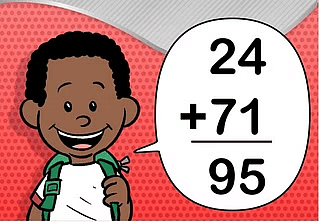
Here we will learn how to add 4-digit and 5-digit numbers
Addition of 4-Digit Numbers
Let's learn the addition of 4-Digit Numbers directly through the following examples:
Example 1: Add 5433 and 1522.
Arranging the addends in the column form and adding columnwise, we have,
Thus, 5433 + 1522 = 6955.
Edurev Tips: To add two or more 4-digit numbers, we add the ones, the tens, the hundreds and the thousands.
Example 2: Add 3437 and 4689.
Thus, 3437 + 4689 = 8126.
Example 3: Add 7895, 5675, and 2589
Thus, 7895 + 5675 + 2589 = 16159.
Addition of 5- and 6-Digit Numbers
Now, we have mastered the concepts of addition of 4 digit numbers. Let's learn how to add 5 & 6 digit numbers now!
Method to add 5 & 6 Digit Numbers:
- Step 1: Add the ones.
- Step 2: Add the tens.
- Step 3: Add the hundreds.
- Step 4: Add the thousands.
- Step 5: Add the ten thousands.
(Carry, wherever required.) - Step 6: Add the lakhs.
Example 1: Add 25603 and 12396.
Thus, 25603 + 12396 = 37999.
Working: Add
Example 2: Add 17125 and 13799.
Thus, 17125 + 13799 = 30924.
Working:
Example 3: Find the sum of ninety-four thousand nine hundred sixty-eight and one lakh five hundred seventy-two.
Step 1: First, we write numerals for the addends, in proper columns. Ninety-four thousand nine hundred sixty-eight = 94,968 One lakh five hundred seventy-two = 1,00,572
Step 2: Add the addends and write the sum.Thus, 94968 + 100572 = 195540.
Word Problems
Example 1: A LED TV costs ₹ 21,235. An air conditioner costs ₹ 11,354 more. What is the cost of the air conditioner? What is the total cost of both the items?
Cost of the LED TV = ₹ 21,235
Cost of the air conditioner = ₹ 21,235 + ₹ 11,354 = ₹ 32,589
Total cost of both the items = ₹ 21,235 + ₹ 32,589 = ₹ 53,824.
Example 2: There are 2,28,369 men, 2,15,008 women and 1,98,326 children in a town. What is the total population of the town?
Number of men in the town = 2,28,369
Number of women in the town = 2,15,008
Number of children in the town = 1,98,326
Total population of the town = 2,28,369 + 2,15,008 + 1,98,326 = 6,41,703
Thus, the total population of the town = 6,41,703.
Working:
What are the Properties of Addition?
Property 1
- Changing the order of the two addends does not change the sum.
- This is called the order property of addition.
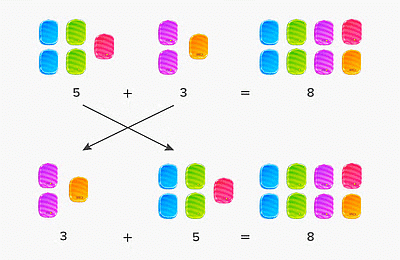
Changing the order of the two addends does not change the sum.
Study the following examples:
Example of Property 1: Find the sum of 4619 and 2836.
Let us add 4619 and 2836 in two ways.
First Way: 4619 + 2836Second Way: 2836 + 4619
We see that, 4619 + 2836 = 2836 + 4619 = 7455.
This proves the order property of addition.
Property 2
- The sum of any number and 0 is that number itself.
- This is called the additive property of zero.
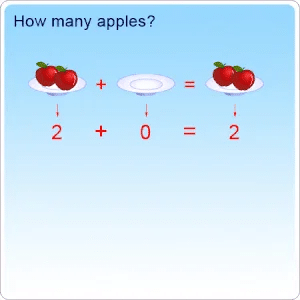 The sum of any number and 0 is that number itself.
The sum of any number and 0 is that number itself.
Example of Property 2: Find the sum of 51682 and 0.
Thus, 51682 + 0 = 51682.
This proves the additive property of 0.
Property 3
- The way in which we group the addends does not change the sum. This is called the grouping or associative property of addition.
- When adding 3 numbers, you may group the first 2 addends or the last 2 addends.
You will always get the same sum. - We call this idea, the grouping or associative property of addition.
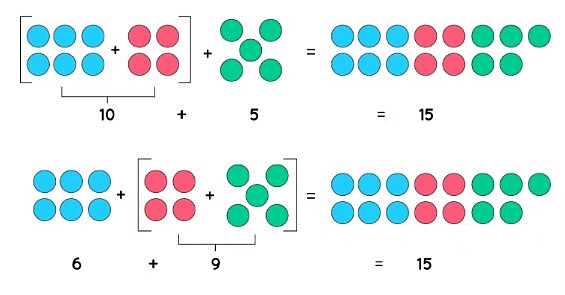 The way in which we group the addends does not change the sum
The way in which we group the addends does not change the sum
Example of Property 3: Add: 6038 + 7767 + 8437
Let us add 6038, 7767 and 8437 in two ways.
First Way: (6038 + 7767) + 8437Second Way: 6038 + (7767 + 8437)
Thus, (6038 + 7767) + 8437 = 6038 + (7767 + 8437) = 22242.
This proves the associative property of addition.
Subtraction
- In a subtraction problem, the larger number from which the smaller number is subtracted is called the minuend.
- The smaller number which is subtracted is called the subtrahend. The resulting number obtained after subtraction is called the difference of the two numbers.
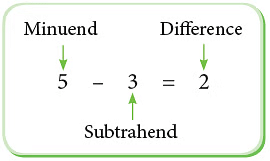
Subtraction of 4-Digit Numbers
Case I: Without Borrowing
Example: Subtract 6432 from 8584.
Thus, 8584 – 6432 = 2152.
Case 2: With Borrowing
Example: Subtract: 6543 – 3874
Thus, 6543 – 3874 = 2669.
Write:
Edurev Tips: Borrow mentally and work out your subtraction question as shown below.
Example: Subtract 6845 from 8762.
We subtract as under:
Thus, 8762 – 6845 = 1917.
Write:
Subtraction of 5- and 6-Digit Numbers
Subtracting with 5- and 6-digit numbers is like subtracting with 1-, 2-, 3- or 4-digit numbers. You subtract the ones, subtract the tens, subtract the hundreds and so on.
Case I: Without Borrowing
Example 1: Subtract 42321 from 76573.
Thus, 76573 – 42321 = 34252.
Case 2: With Borrowing
Example 1: Subtract 2,97,973 from 5,82,621.
Thus, 5,82,621 – 2,97,973 = 2,84,648.
Write:
Edurev Tips: Do the borrowing mentally.
Word
Problems
Example 1: A factory produced 2,80,575 LED bulbs in 2017. In 2018, it produced 3,50,780 bulbs. By how many bulbs did the factory’s production increase?
Number of bulbs produced in 2018 = 3,50,780
Number of bulbs produced in 2017 = 2,80,575
Number of bulbs increased in 2018 = 3,50,780 – 2,80,575 = 70,205Thus, the increase in the production of number of bulbs in 2018 is 70,205.
Example 2: A stadium has a seating capacity of 1,02,225. The government increases the size of the stadium. Now, the seating capacity is 1,25,000. How many new seats are added in the stadium?
New seating capacity = 1,25,000
Old seating capacity = 1,02,225
Number of new seats added = 1,25,000 – 1,02,225 = 22,775Thus, the number of new seats added in the stadium is 22,775.
Addition and Subtraction Together
Sometimes, we need to solve a problem that involves both addition and subtraction. In such cases, first, we add and then subtract.
Example 1: Simplify: 5109 – 3178 + 12863.
Step 1: First, we add 5109 and 12863.
Step 2: Subtract 3178 from the sum obtained in step 1.
Thus, 5109 – 3178 + 12863 = 14794.
Estimating Sums and Differences
To estimate a sum or a difference, first round off each number to its nearest tens, hundreds or thousands as per the number of digits in the numbers and then, add or subtract.
Example 1: Mr Khan bought a mobile for ₹ 8,793 and a chair for ₹ 3,925. Estimate how much did he pay more for the mobile?
Estimated cost of a mobile = ₹ 9,000 (8793 rounded to the nearest thousand as 9,000.)
Estimated cost of a chair = ₹ 4,000 (3925 rounded to the nearest thousand as 4,000.)
So, Mr Khan paid about ₹ 9,000 – ₹ 4,000 = ₹ 5,000 for mobile.
Example 2: Estimate the sum of 247 and 1,375 by rounding each number to the nearest hundred. Also, compare with actual sum?
So, the estimated sum is 1600 and the actual sum is 1622.
Difference = 1622 – 1600 = 22.
Hence, the actual sum is 22 more than the estimated sum.
|
30 videos|210 docs|69 tests
|
FAQs on Notes: Addition & Subtraction - Mathematics & Pedagogy Paper 1 for CTET & TET Exams - CTET & State TET
| 1. Why is it important to study addition and subtraction? |  |
| 2. What are the properties of addition? |  |
| 3. What are the properties of subtraction? |  |
| 4. How are addition and subtraction related? |  |
| 5. How can understanding addition and subtraction help in standardized tests like CTET and State TET? |  |

